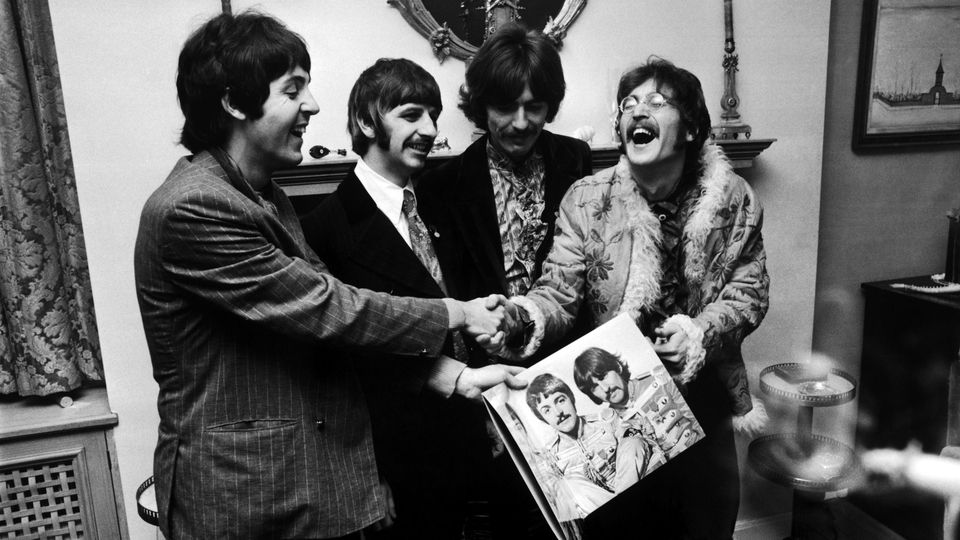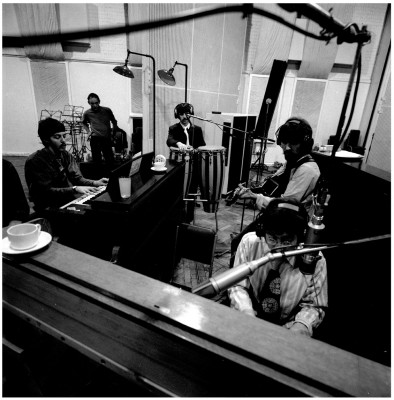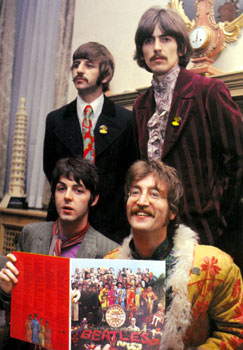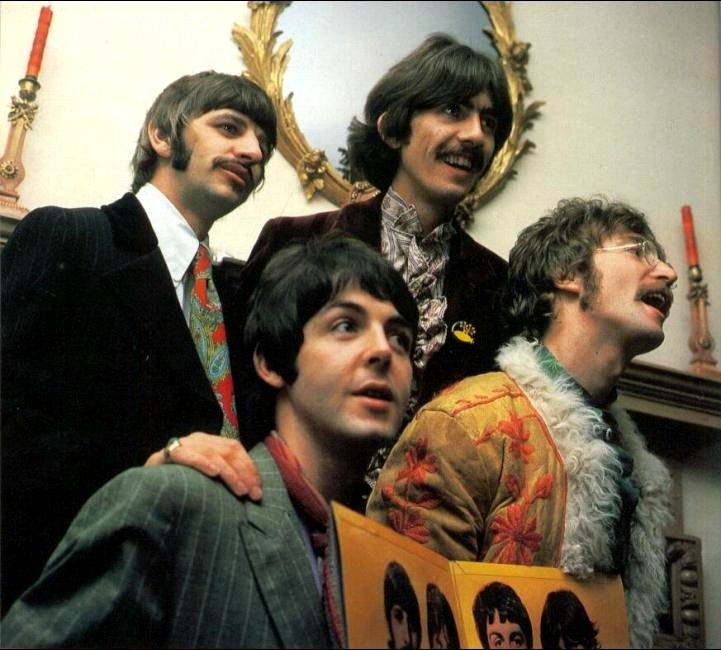|
Sgt. Lennon’s Lonely
Hearts Club Band
 
The Beatles at the listening party for
"Sgt. Pepper's Lonely Hearts Club Band," June 1967.
by Rip Rense*
Paul McCartney on the making of Sgt. Pepper:
"We were tinkering away with glee."
It’s a
Paul album.
That’s the
perception about “Sgt. Pepper’s Lonely Hearts Club Band” that’s taken
hold through the decades among critics and biographers, and not without
cause:
*The glib
band-within-a-band concept---which was almost an afterthought to the nearly
five months of recording sessions---was Paul’s.
*Paul was the principal
writer of seven of the album’s 13 songs (okay, six if you don’t count “Sgt.
Pepper---reprise” as a separate song) and he sings solo on eight, when you
count his contribution to “A Day in the Life.”
*Every song on “Pepper”
is rife with McCartney at his musically brilliant best, from incandescent
harmony vocals to manic, searing lead guitar lines (“Sgt. Pepper,” “Good
Morning, Good Morning”) to bedrock keyboards and absolutely stellar
bass-playing that might just be the most lyrical and exuberant in all pop
music (really.)
*Lennon, in a fit of
anti-Beatles bitterness and artistic second-guessing, famously dismissed the
album as "crap." (Really.)
The bass playing alone
indicates the degree of McCartney dedication to the "Pepper" project. I
mean, we’re talking natural, unfettered, youthful genius here. These are not
bass-lines, they are arrangements, counter-melodies, arched eyebrows,
muttered asides, kinetic machinery, pure verve. John's “Lucy in the Sky With
Diamonds” would feel limp without Paul’s bass pushing it along, launching
the choruses and holding them aloft. The almost Wagnerian instrumental
declaration just before the final verse of “A Day in the Life” turns out
merely to be George Martin having the good sense to have orchestrated a
McCartney bassline(!). Small wonder, as Geoff Emerick revealed in his
indispensible memoir, “Here, There, and Everywhere,” Paul often stayed at
the “Pepper” sessions long after the others had gone home, laboring through
the night at perfecting the bass. Over and over, until his fingers literally
bled.
As
for McCartney’s “Pepper” songs, many a critic has put the knock on them as
decades passed, deriding them as fluffy, shallow, cloying, silly Beatles
flower-power funsy-wunsy. These are usually the same critics, not incidentally,
who have denigrated the album as well, calling it dated, of its time, corny,
hardly the Beatles’ best (that honor generally is reserved by such persons
for the indisputably less adventurous “Revolver.”) This is a case of
critical over-analysis, of writers looking to leave their mark, and most of
all, of evaluating the album against a standard that took hold in the ‘70’s
and ‘80’s---one that prizes starkly confessional and otherwise
self-indulgent lyrics (no matter how banal or puerile) and music that need
not have any structural originality or melodic distinction, let alone
inspiration. Take three chords: add shouting.
Whatever the revisionist
rap on “Pepper” might be, it is certainly not based on the lack of interesting
lyrics, structural originality, or melodic distinction.
Many critics, I think,
have forgotten that “Pepper” was a kind of pinnacle of genre, a new sort
of music that had never exactly existed before. You no more dismiss its
importance and achievement than you dismiss Beethoven’s Ninth Symphony
because it’s 19th century orchestral music. Continuing that analogy, you
don’t evaluate the Ninth Symphony as a collection of movements that have no
particular relationship to one another, and you do not evaluate “Sgt.
Pepper” as a bunch of songs that happened to appear together on a vinyl
disc. This album is a piece. Though not conceived as a whole, it was
executed as one---the product of a single gigantic and intense series of
recording sessions. It also bears remembering that there were no hits from
“Pepper,” no singles. The whole damn thing was a hit, and the biggest of its
time, if not all time. In the summer of 1967, in many cities, you could not
walk the length of a block without leaving earshot of this record.
Humanity’s collective jaw was agape, its ears full of iridescent,
irresistable sounds of a kind it had never experienced.
Still, it’s quite true
that Paul’s songs on the album---“Getting Better,” “She’s Leaving Home,”
“When I’m Sixty-Four,” “Lovely Rita,” and the “Pepper” intro and
reprise---do not stand on their own as weighty artistic utterances---but
they were not intended to. They were of the moment, springing from the
fecund period of joyful discovery and runaway invention that marked The
Beatles in studio, 1966-’67. They weren’t planned, contrived, plotted,
forced---they happened. They were, to borrow a term from the time,
happenings. (Well, with the exception of “When I’m 64,” which McCartney
wrote as a kid and apparently decided to realize for its sweet, campy,
music-hall-tradition infectiousness---a tribute to his dad, who led a jazzy dance band in the
1920’s.) And they are indispensable gems within the overall album context.
“Pepper” without McCartney is like pepper without. . .
Take “Getting Better,” generally dismissed by critics as a trifle, if not
treacle. This is nothing less than a 24-karat sample of the twinkly,
vivacious optimism that seemed to infuse the psychedelicized youth culture
of the day---and stood, not incidentally, in stark opposition to the
oppressive horrors of the nightly news. Taken alone, out of context, yes, it
is lesser, frillier Beatles stuff. But stuck between the Magritte/Lewis
Carroll-esque fabric of John’s “Lucy in the Sky With Diamonds” and the musing
of Paul’s uncharacteristically pensive “Fixing A Hole,” the song becomes
absolutely thrilling for its unbridled joie d’vivre (and, thanks to
John’s “can’t get no worse,” its winking bit of cynicism.) And one must
remember, the world was especially in need of joie d'vivre in the
Vietnam/draft-dreary summer of '67.
For all their
infectiousness and exuberance, though, it is true that the Paul
“Pepper” songs do not stand alone as well as most other latter McCartney
Beatles songs (“Eleanor Rigby,” “Fool on the Hill”), which is further
testament to the take-it-a-whole nature of “Pepper.” These tunes find much
of their value in creating the overarching power and charm of the album.
They are members of a team. Perhaps this is one
factor that has since contributed to critics’ slighting them. After all, the
finest, most substantial McCartney work from the “Pepper” sessions did even
not make the album: “Penny Lane.” (The band was induced by Brian Epstein to
give it up, along with Lennon’s immortal “Strawberry Fields Forever,” for a
single. A single!)
Did McCartney do
this by design? Hardly. As I said, his songs just happened, and he went with
them. One could construe that he was so busy musically stoking the
sessions and group (he was practically music director at the time, Emerick
asserts) that his songwriting energies were compromised a bit during the
project. The man was never more engaged or happy as a Beatle, without a
doubt, than he was during “Pepper.” And well he should have been, as all his
formidable talents as arranger, instrumentalist, songwriter, composer were
in full play.
In fact, absent
McCartney’s obsessive work ethic, there would have been no “Pepper” at
all. Paul was the guy pushing the others to come to the studio every day,
especially John, who probably would otherwise have been content to stay
home, tripping on LSD. Lennon acknowledged---complained, really---that Paul
rang him up at home incessantly, exhorting him to come to the studio and
compose, sing, record. Their opposing work dispositions were well in
evidence: Paul the enthusiastic nine-to-five Beatle; free-spirited,
spontaneous John reluctantly embracing any sort of disciplined schedule.
(The fact that he was locked in an unhappy marriage reportedly had much to
do with his willingness to go to work, and ensuing productivity. Lennon was
the Lonely Heart in this band.) And show up John did, though he was also
enticed by the creative potential afforded by unlimited studio time and
hallucinogen-stoked sensibilities.
Lennon, at least to
an extent, subordinated his ambition and personality during “Pepper,” often
deferring to McCartney’s fervor and natural musical leadership. As a result,
there was a good give-and-take partnership between them, and it shows
throughout the record, notably in their merging of songs that became “A Day
in the Life,” shared lead vocals in “She’s Leaving Home,” and, famously, in
Lennon’s “it can’t get no worse” parenthetical vocal in “Getting Better.”
John, with no small assist from lysergic acid and a confining home life,
checked his ego at the door. Or enough of it to indulge Paul’s.
This was, really, the last great period of Lennon-McCartney cooperation.
Let it not be overlooked that the orchestral cataclysm in Lennon's "A Day in
the Life" was entirely a Paul inspiration, as was the mellotron intro in the
Pepper sessions song, "Strawberry Fields Forever." And one of the nicest, most telling aspects of
this Lennon-McCartney give-and-take is revealed on “The
Beatles Anthology, Vol. 2” version of John’s pet composition, “Being For the
Benefit of Mr. Kite.” On it, you hear him take a pass or two at the lead
vocal, but he is clearly not pleased. There is some chatter, and then
McCartney is heard to explain that the verses are sung by a barker who is
very burned out on his job. Paul then half-sings, half-scats the first line
or two, in the voice of someone bored from reciting the same stuff from show
to show. Lennon takes the cue, and the vocal becomes the removed, vaguely
interested narrative that we know and love today. Lennon-McCartney was
hardly just a song credit, or a mere description of a mechanical writing
partnership. These guys collaborated in many ways.
So there is ample good
evidence to accept the well-worn idea that “Pepper” is largely Paul’s album.
It’s an easy argument to make, and one that has become pat through the
years, yet I would submit that it is a disservice.
“Pepper,” I believe, is
as much, if not more of a John Lennon album. And I guess I must say this
with apologies to Lennon, who characteristically slighted the record, as he
did almost all his Beatles work at one time or another, in later interviews.
Where McCartney’s six
songs (not counting “Pepper Reprise”) tend to be “merely” lyrical, Lennon’s
five (counting “With A Little Help From My Friends,” which was, depending on
what you read, partly or largely his
work) bring striking variety and dimension in terms of music and content:
Alice-in-Wonderland poetry, melodies that are beguiling, unpredictable,
novel, indelible. Is there a more haunted song and lyric in the entire
Beatles canon than “A Day in the Life?” Where McCartney tends to be
endearingly wistful, playful, occasionally reflective, as he is in “Fixing a
Hole,” Lennon’s lightest whimsy always has bite, mystery, bonafide
weirdness. “Rocking horse people eat marshmallow pies” is somewhere between
Fellini and H.P. Lovecraft; “nothing to do to save his life, call his wife
in” is eerie stuff for a daffy rocker called “Good Morning, Good Morning.”
Who put the salacious orgasm noises in “Lovely Rita?”
Lennon brings a great
many qualities to the album that would otherwise be entirely absent. There
is a journalism, a topicality, a world-weariness in the words to “A Day in
the Life.” He blew his mind out in a car, as is well known, was
inspired by an article in the morning paper about a young heir to a fortune,
Tara Browne, killed in a car accident. What more suggests entropy,
disassociation than the line, “I read the news today, oh boy. . .”,
and is there a more wry comment on general human absurdity than his reaction
to another news report about having found 4,000 holes in Blackburn,
Lancashire: “Now they know how many holes it takes to fill the Albert
Hall.” Many a Brit got a chuckle out of, “It’s time for ‘Tea and Meet
the Wife,’” a reference to an English radio comedy that was lost on the
States.
|

Making musical history, early '67. |
Lennon’s “Pepper” songs are implicitly and overtly autobiographical as
well. The “psychedelic” qualities of “Lucy,” “Kite,” “Life,” very much
reflected his own life and state of mind at the time, and as was often the
case, there are bits of personal commentary thrown in where you’d least
suspect them. “Lucy” is famously inspired by a drawing that his son, Julian,
brought home from school. “Mr. Kite” comes from a poster in Lennon’s living
room. “Going to work, don’t want to go, feeling low-down/ Headed for home,
you start to roam, then you’re in town. . .” from “Good Morning” seems a
direct chronicle of his life as reticent banker’s-hours Beatle-husband---and
this song, which he also later laconically dismissed as a “load of crap,”
can easily be read as a tale of an afternoon walk he might have taken. In
fact, Lennon’s songs are all excursions, journeys. “Mr. Kite” takes the
listener to a circus that is part Old England, part circus of the mind.
“Life” transports one to buses, films, and sonic zones never visited again
by any other musical group.
There is, in fact, an
almost measurable musical majesty in “Lucy” and “Life” that doesn’t exist
elsewhere on the album---even, arguably, in The Beatles’ oeuvre---except
possibly in the monument to mysticism that is George Harrison’s “Within You,
Without You.” All McCartney’s “Pepper” songs combined do not really approach
the power and weight of either Lennon (or Harrison’s) “Pepper” moments
(though, to be fair, they were hardly meant to.)
Then there are the light,
whimsical touches, always stereotypically ascribed to Paul. This is as
dangerous a supposition as saying that Lennon was "the serious Beatle." Let
it be remembered that it was John who: wanted the childlike sound of the
autoharp in “Day in the Life,” came up with the comb-and-paper harmonica
flourishes in “Lovely Rita,” described the magical sounds in his head that
George Martin translated into the madcap pastiche of broken calliopes in
“Kite,” added the orgasmic panting in “Rita,” came up with the wacko,
inspired conceit of smaller animals being gobbled up by progressively larger
ones in the outro of “Good Morning, Good Morning,” and wrote the grand
call-and-answer passages of “With A Little Help From My Friends”---with the
hilarious lines, “What do you see when you turn out the light/ I can’t
tell you, but I know it’s mine.”
Speaking of “A Little
Help,” it must not be forgotten that this winning song---which had special
meaning in the summer of '67, when a lot of kids were vagabonding---contained
a significant amount of Lennon work written at the last minute to give Ringo a
vocal on the record. As he did with “All You Need is Love,” John contributed
importantly to this
bit of perfection, and there is not another song like it in all the
Beatles’ output. Whether it was mostly a McCartney effort or mostly a Lennon
effort differs according to which interviews you read, but either way, it was deliberately and lovingly written for Ringo, the
person and personality. “What would you think if I sang out of tune?”
would not have sounded as funny or sweet, sung by a voice less earthy,
earnest, and lovable. In a late ‘60’s interview about the album, Ringo
remarked of John’s writing in “A Little Help,” “He’s got a lot of soul,
has John.”
In a way, that sums it
up. If McCartney was the music director, multi-tasker, and
arranging/performing genius behind “Pepper,” Lennon brought the album a lot
of its soul---as did Ringo’s grand vocal and Harrison’s
philosophical soul-searching in the Hindu-drenched declamations of “Within
You, Without You.” But it’s much more than that. Lennon’s "Pepper" songs,
unlike Paul’s, stand on their own as among his greatest. They have weight,
wit, and wonderment in music and lyric. They are hypnotic, transporting,
sometimes deeply affecting---in ways that are still hard to identify, all
these years later.
When you combine this
with the Lennon compositional flights-of-fancy realized with the help of Martin, Emerick, and the other Beatles, the album’s ultimate impact owes at least as
much to John Lennon as it does Paul McCartney. And although Lennon would
have great moments to come (“Revolution 1” and “Across The Universe” stand
as two of the greatest unsung heroes in Lennon Beatles work), I not only
think of “Pepper” as being, on balance, more of a Lennon album, but as
Lennon’s last great Beatles album.
Thanks, in no small
measure, to those hectoring phone calls from Paul.
|
 
It was 40 years ago today---June 1, 1967---that "Sgt. Pepper" was
released. Sigh. |
* This article was rejected by the San Francisco Chronicle, New York
Times, Washington Post, Los Angeles Times, Rolling Stone, L.A. Weekly, and a
couple of on-line magazines, just for good measure.
Beatlefan, in its infinite wisdom and
good judgment, published it.
ADDITIONAL 'PEPPER' ANNIVERSARY FUN:
RENSE:
SAMPLE CHAPTER FROM ‘THE
OAKS’ THAT IS ALL ABOUT PEPPER
http://riprense.com/godspajamas.htm
The Beatles at Youtube
The Beatles at Myspace
LISTEN: Remembering the Release of Pepper
JODY ROSEN: Everything You Know About 'Sgt. Pepper's' is
Wrong
(This is the best 'Pepper' article of the
summer---RR)
http://www.slate.com/id/2167998/fr/flyout
The backlash is based on the wide
disdain for Paul McCartney among critics. The truism goes that Sgt. Pepper's
is a McCartney album, a pop confection, full of cute noises and
neo-music-hall pop, recorded while the drug-addled Lennon was lost in a
half-conscious haze. But again, the myth disintegrates on inspection.
Beatles on the Brain
http://www.guardian.co.uk/comment/story/0,,2093594,00.html
The Secret of Sgt. Pepper's Medals
http://www.dailymail.co.uk/pages/live/articles/news/news.html?in_article_id=459090&in_page_id=1766&ito=1490
How The Album Might Have Been
Even Better
http://www.news.com.au/heraldsun/story/0,21985,21833393-2902,00.html
The two omitted songs:
http://www.youtube.com/watch?v=Ywg-PdeGVL0&mode=related&search=
http://www.youtube.com/watch?v=YHBKAyn17vw&mode=related&search=
And the second George song recorded for the album, but didn't make the
cut:
http://www.youtube.com/watch?v=EjAVqK2nqmI (mono version)
http://www.youtube.com/watch?v=xzh5uWgOmDU (stereo version)
Amazing and weird stuff about Pepper
http://www.beatlesagain.com/btsgtppr.html
Pepper, A to Z
http://www.star-ecentral.com/news/story.asp?file=/2007/5/31/music/20070531083906&sec=music
WONDERFUL WORLD OF PEPPER
http://news.bbc.co.uk/2/hi/entertainment/6709649.stm
WHATEVER BECAME OF LUCY IN THE SKY?
http://entertainment.timesonline.co.uk/tol/arts_and_entertainment/music/article1867817.ece
TEN REASONS I LOVE PEPPER
http://www.canada.com/victoriatimescolonist/news/arts/story.html?id=de08b287-7f95-4748-9615-3731e87990b7
BANDS PAY TRIBUTE TO
GREATEST POP ALBUM EVER MADE
http://news.bbc.co.uk/2/hi/entertainment/6711385.stm
ARE THERE ANY GOOD REWORKINGS OF
‘PEPPER’ TRACKS?
http://blogs.guardian.co.uk/music/2007/06/are_there_any_good_covers_of_s.html
LOOKING BACK:
http://news.yahoo.com/s/nm/20070531/music_nm/arts_pepper_dc_1
http://www.pe.com/entertainment/stories/PE_Fea_Daily_D_music.beatles.pepper.283a3ce.html
http://www.nydailynews.com/entertainment/tv/2007/05/31/2007-05-31_how_pepper_shook_things_up_on_airwaves-1.html
NO ONE OUTRANKS SGT. PEPPER
http://www.newsday.com/entertainment/music/ny-ffmus5235903jun03,0,2567579.story?track=rss
SGT. PEPPER STILL EARNS ITS STRIPES
http://recordnet.com/apps/pbcs.dll/article?AID=/20070531/A_ENTERTAIN/705310306/-1/rss05
CHURCH TO PERFORM PEPPER
http://www.hamiltonspectator.com/NASApp/cs/ContentServer?pagename=hamilton/Layout/Article_Type1&c=Article&cid=1180328178672&call_pageid=1020420665036&col=
NEW FANS FOR PEPPER
(And there always will be.)
http://www.reuters.com/article/musicNews/idUSL3131078620070601?src=060107_1351_FEATURES_science
BACK TO PAGE ONE
|
![]() Sgt. Lennon's Lonely Hearts Club Band
Sgt. Lennon's Lonely Hearts Club Band